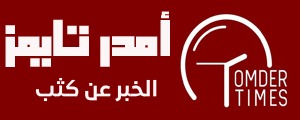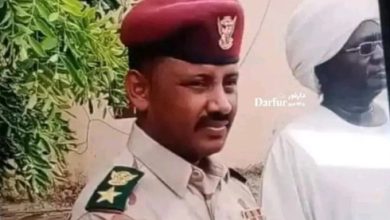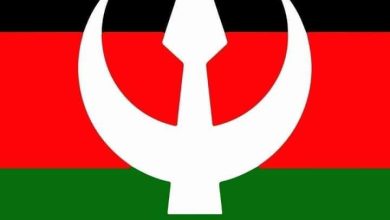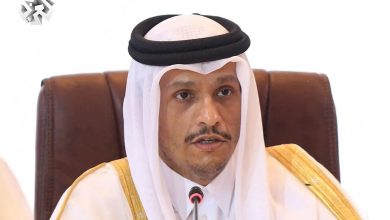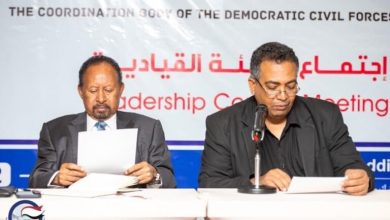السودان في مجلس الأمن .. تقرير أكتوبر
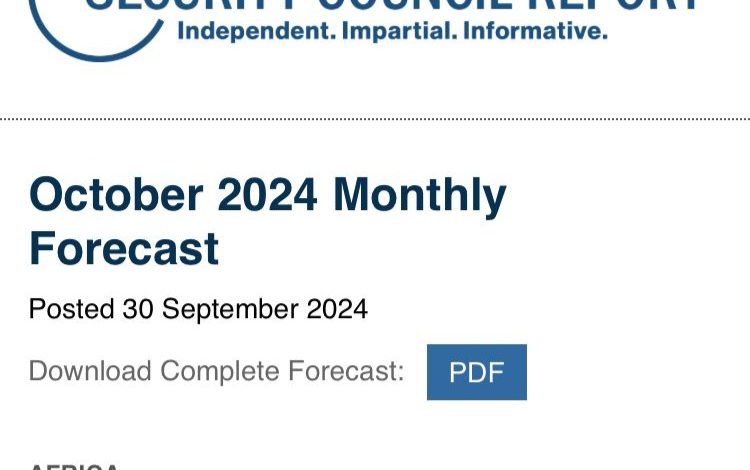
امدر تايمز : الامم المتحدة
من المتوقع أن يتلقى المجلس إحاطة بشأن الوضع في السودان. وبموجب القرار 2715 الصادر في 1 ديسمبر/كانون الأول 2023، والذي أنهى ولاية بعثة الأمم المتحدة المتكاملة للمساعدة الانتقالية في السودان (يونيتامس)، طلب مجلس الأمن من الأمين العام تقديم إحاطة كل 120 يومًا بشأن “جهود الأمم المتحدة لدعم السودان على مساره نحو السلام والاستقرار”.
ستتولى سويسرا رئاسة مجلس الأمن في أكتوبر 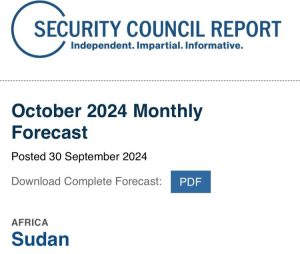
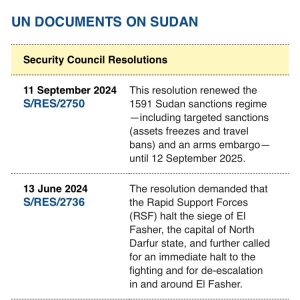
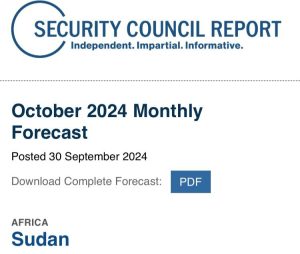
[١/١٠, ٦:٤٢ م] فيصل حضرة: Security Council Report
October 2024 Monthly Forecast
Posted 30 September 2024
Download Complete Forecast:PDFAFRICA
Sudan
Expected Council Action
In October, the Security Council is expected to receive a briefing on the situation in Sudan. Pursuant to resolution 2715 of 1 December 2023, which terminated the mandate of the UN Integrated Transition Assistance Mission in Sudan (UNITAMS), the Security Council requested the Secretary-General to provide a briefing every 120 days on the “UN’s efforts to support Sudan on its path towards peace and stability”.
In line with resolution 2736 of 13 June, the Secretary-General is also expected to present recommendations for the protection of civilians (PoC) in Sudan, ahead of the briefing in October.
Key Recent Developments
The ongoing conflict between the Sudanese Armed Forces (SAF) and the Rapid Support Forces (RSF), which began in April 2023, has triggered a catastrophic humanitarian crisis in Sudan, including significant civilian casualties, mass displacement, dire food and water shortages, and the collapse of healthcare and essential services. As at 16 September, more than 23,015 people had been killed since the onset of the conflict, according to the Armed Conflict Location and Event Data Project, a non-governmental organisation that collects conflict-related data. Some estimates suggest, however, that the number of casualties may be significantly higher. The war has displaced approximately 10.5 million people, 2.2 million of whom have sought refuge in Sudan’s neighbouring countries—the Central African Republic (CAR), Chad, Egypt, Ethiopia, Libya, South Sudan, and Uganda—making it the world’s largest displacement crisis. (For background and more information, see the brief on Sudan in our September 2024 Monthly Forecast and listen to our 4 September podcast episode.)
El Fasher, the capital city of North Darfur state and the only capital in the Darfur region outside the RSF’s control, has been one of the main areas of strife between the warring parties, marked by inter-communal fighting since early April. According to media reports, the fighting in El Fasher escalated on 12 September as the RSF launched an attack on the city from multiple directions. The mid-term report of the Panel of Experts assisting the 1591 Sudan Sanctions Committee, transmitted to Council members on 7 August, confirmed that both sides possessed and were using heavy weaponry in El Fasher.
On 18 September, the Council held an open briefing to discuss the situation in El Fasher. Briefing on the humanitarian situation, Acting Under-Secretary-General for Humanitarian Affairs Joyce Msuya reported heavy shelling and aerial bombardment in the city, affecting civilians and civilian infrastructure, including health facilities and camps for internally displaced persons (IDPs). She expressed concern about reports of intense shelling in the central and western parts of the city and the deployment of additional forces. Msuya said that she was “horrified” by signs that the fighting might intensify as the rainy season draws to a close in the coming months. At the same meeting, Assistant Secretary-General for Africa in the Departments of Political and Peacebuilding Affairs and Peace Operations (DPPA-DPO) Martha Ama Akyaa Pobee noted that “a dangerous new reality has now emerged in the wake of the El Fasher escalation with grave and unpredictable ramifications”. She stressed that the escalation risks widening and entrenching the armed conflict, deepening ethnic polarisation of Sudanese society, and further destabilising the region.
In a 21 September statement, UN Secretary-General António Guterres expressed alarm about the RSF’s “full-scale” assault on El Fasher and called on its leader, General Mohamed Hamdan Dagalo, to halt the attack immediately. He called it “unconscionable” that the warring parties had repeatedly ignored calls for a cessation of hostilities, warning that any further escalation could threaten to spread the conflict along intercommunal lines throughout Darfur. He stressed the urgent need to secure a ceasefire in El Fasher and across all other conflict zones in Sudan.
On 21 September, the members of the Aligned for Advancing Lifesaving and Peace in Sudan (ALPS) Group—Egypt, Saudi Arabia, Switzerland, the United Arab Emirates (UAE), the US, the African Union (AU), and the UN—convened virtually. (The group was established at the recent round of talks led by the US in Switzerland from 14 to 23 August.) The members welcomed the opening of the Kassala and Dongola airports for World Food Programme (WFP) humanitarian assistance flights. They also welcomed the reports that humanitarian operations had resumed across conflict lines from Port Sudan through Shendi to Khartoum. They called on the international partners to join efforts to reach immediate humanitarian pauses in the fighting in El Fasher, Sennar, Khartoum, and Al Jazirah states. (For background and more information, see the brief on Sudan in the September 2024 Monthly Forecast and 5 September What’s in Blue story.)
Human Rights Related Developments
On 6 September, the International Fact-Finding Mission for Sudan, established by the Human Rights Council in October 2023, released its first report. The report found that the SAF, the RSF, and their respective allied militias, are responsible for widespread violations, including indiscriminate and direct attacks carried out through airstrikes and shelling against civilians, schools, hospitals, communication networks, and vital water and electricity supplies. The report concluded that there are reasonable grounds to believe that several established violations of international humanitarian law constitute war crimes committed by both warring parties. It further established reasonable grounds to believe that the RSF and allied militias have committed crimes against humanity, including murder, torture, enslavement, rape, sexual slavery, acts of a sexual nature of comparable gravity, persecution on the basis of intersecting ethnic and gender grounds, and forced displacement. The report recommended the deployment of an independent and impartial force with a mandate to protect civilians in Sudan. It further noted that there is a risk that those supplying arms to the warring parties may be complicit in grave violations of human rights and humanitarian law.
In a 10 September statement, UN Deputy High Commissioner for Human Rights Nada Al-Nashif noted that the parties to the conflict have failed to adhere to declarations aimed at protecting civilians, as violations have continued unabated. Between June and August, the Office of the High Commissioner for Human Rights (OHCHR) documented over 864 civilian deaths resulting from attacks on residential areas across Sudan. Al-Nashif also expressed alarm over “the use of sexual violence as a weapon of war” since the conflict began, attributing 81 percent of sexual violence incidents to men in RSF uniforms and allied militias. She also pointed to credible reports of sexual violence attributed to SAF troops and allied armed movements.
Key Issues and Options
The overarching issue for the Security Council is how to halt the ongoing fighting and support efforts to achieve a sustainable ceasefire across Sudan. A related concern is the situation in Darfur and the levels of intercommunal violence and insecurity throughout the country. In light of the continuing violence across the country, the lack of implementation of relevant Security Council resolutions, and the failure of mediation initiatives to achieve meaningful breakthroughs, Council members face several questions, including:
how to bring the Sudanese warring parties to a meaningful dialogue,
how to protect civilians and enforce compliance with international humanitarian law,
how to ensure accountability for past and ongoing crimes, and
how to mitigate the regional spillover effect of the conflict.
One option for Council members would be to invite the Secretary-General’s Personal Envoy for Sudan, Ramtane Lamamra, to brief on his engagements with relevant stakeholders and the Secretary-General’s recommendations for protecting civilians in Sudan. Council members may also wish to hold a private meeting with the actors holding influence over the Sudanese warring parties to discuss the search for a mediated solution to the crisis and evaluate the implementation of the PoC recommendations.
Another avenue for further deliberations on the Sudanese crisis could be the annual joint consultative meeting between the AU Peace and Security Council (AUPSC) and the UN Security Council, scheduled for 18 October.
An additional issue for the Security Council is the humanitarian crisis and how to foster the continuous and unimpeded delivery of humanitarian aid while also securing the safety and security of UN officials and other humanitarian actors. The fact that aid at scale is not reaching people in need is a further concern for Council members. The humanitarian situation has been exacerbated by the spread of disease and the collapse of the healthcare system. According to the World Health Organization (WHO), at least 12 of the 18 states in the country are experiencing three or more simultaneous outbreaks of different diseases, while fewer than 25 percent of health facilities in the conflict-affected states are currently functional. Periodic briefings by the Office for the Coordination of Humanitarian Affairs (OCHA) could help keep the Council informed about the humanitarian situation on the ground.
Another option for Council members is to conduct visiting mission to Sudan to assess the situation on the ground and engage with relevant stakeholders. This mission could also provide an opportunity for Council members to visit the refugee camps in neighbouring countries, particularly Chad.
Council and Wider Dynamics
Most Council members share similar concerns about the dire political, security, and humanitarian situations in Sudan. Members have diverging views, however, on the tools that the Council should use to address these situations.
One of the points of contention during the negotiations on resolution 2750 of 11 September, which renewed the Sudan sanctions regime for one year, related to how to reference the central authorities in Sudan. Countries such as China, Russia, and the members of the “A3 plus one” grouping (Algeria, Mozambique, Sierra Leone, and Guyana) called for maintaining the term “Sudanese government”. On the other hand, the US (penholder on Sudan sanctions) and some other members strongly supported the use of term “Sudanese authorities”. Russia considers Sudan’s Transitional Sovereign Council, led by General Abdel Fattah al-Burhan, head of the SAF, as Sudan’s highest legitimate authority. During the negotiations, however, some members argued that the SAF had lost territorial control over parts of the country and that the term “Sudanese authorities” encompasses the offshoots of the government body. (For background, see the and 10 September What’s in Blue story.)
Russia has maintained the position that Sudanese government forces remain responsible for protecting civilians. In a similar vein, it has argued that any cooperation and coordination on humanitarian assistance should be carried out via channels agreed with the Sudanese government as the sole entity responsible for aid distribution and relief assistance. It has also opposed any references that might imply that the Sudanese government is on par with any other Sudanese entity.
During a joint press conference with US Secretary of State Antony Blinken, Egyptian Foreign Minister Badr Abdelatty stressed the “importance of not putting the Sudanese army in the same equation of any other party, and the importance of working on activating the rule of the Sudanese institutions in order for the Sudanese state to maintain the sovereignty of Sudan”.
The US considers that some political forces—such as former regime officials from the National Congress Party, which ruled Sudan under former President Omar al-Bashir—have undermined al-Burhan and efforts to end the war. During the 18 September Council briefing, however, Russia argued that “it is crucial to involve all influential political forces and the country’s main ethno-confessional groups, including authoritative regional leaders”.
Tensions have mounted between the Sudanese government and the UAE, considering the latter’s reportedly continued support to the RSF, including through the supply of weapons and equipment. Speaking at the 11 September Council meeting, Sudan accused the UAE of acting with impunity, leveraging its substantial fuel reserves and strategic importance. It called on third countries to exert pressure on the UAE to alter its course, including using possible sanctions. Sudan also called for a review of weapons export policies to the UAE, claiming these weapons are being used by the RSF to besiege Darfur. A 21 September New York Times article alleged that the UAE has misused the Red Crescent symbol, protected under international humanitarian law, as a “cover for its secret operation” involving drone flights into Sudan and weapons smuggling, citing US officials and satellite imagery. The article claimed that the UAE is using an airport in eastern Chad, which has been expanded into a military-style airfield, to transport advanced military drones for the RSF, which have been detected patrolling over El Fasher. The UAE has denied transferring weapons to the RSF, including in correspondence to The Economist sent by the UAE’s Assistant Minister of Foreign Affairs for Political Affairs Lana Nusseibeh
